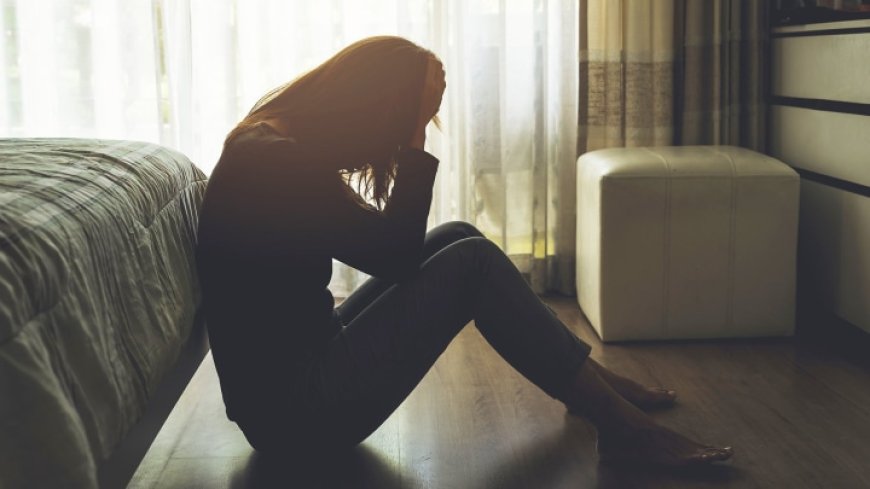DEPRESSION: An understudied phenomenon
Depression is a common mental health issue that affects millions of people worldwide. It is a chronic mood disorder that causes persistent feelings of sadness, emptiness, and loss of joy. This article explores the causes and triggers of depression, its different types, and ways to overcome it.

The different motivational quotes that tell people to face their fears, hold in their miseries and insecurities, the gossip that won't stop sticking in the ears of people on their failed marriages, failed attempts to succeed and failed examinations, the fear of mockery and stigmatization, the added insult on an already injured heart, and damaged self-esteem contribute to the high rate of suicidal attempts.
Many people take for granted other people's feelings and pry on their vulnerability, attributing it to weakness and failure. Hence, making it hard for people to speak out or confide in other people.
Many have lived their whole lives wallowing in their unshared miseries, clinging onto the life which every day seemed like a sting on their necks, many developed lasting ailments that led to their deaths and many have taken their own lives.
The variation to Depression is that while some people realize they have it, some do not even know what it means.

Image source: Getty Images/iStockphoto
WHAT IS DEPRESSION?
Depression is a common mental health problem that involves a low mood and a loss of interest in activities. It is a chronic mood disorder that causes persistent feelings of sadness, emptiness, and loss of joy. Depression is different from grief and other emotions a person may feel following difficult life events but either the former or the latter can trigger it.
According to the World Health Organization, depression is the leading cause of disability worldwide and a major contributor to the overall global burden of disease. It is estimated globally that 5% of adults suffer from it and the latest estimates from WHO state that more than 300 million people are now living with depression, with an increase of 18% between 2005 and 2015.
CAUSES AND TRIGGERS OF DEPRESSION
There are many different reasons one can develop depression; it would be of great advantage if one knows the risk factors and causes of depression to understand why it occurs and how to deal with it.
These causes include:
1. Genetics: one is most likely to inherit the disorder when the family has histories of members who have had episodes of it in the past.
2. Illness: if the person suffers from chronic life-challenging illness(s) that has a lasting effect on the person. Chronic illnesses like degenerative neurological disorders, cardiovascular diseases, epilepsy, brain tumor, cancer, endocrine disorder, and so on.
3. Giving birth: one of the postnatal effects of childbirth on mothers is depression.
4. Loneliness
5. Alcohol and drugs
6. Aging
7. Traumatic or adverse childhood events: Some events affect the way one's body reacts to fear and stressful situations.
8. Difficult life events and issues.
9. Long-term abuse or conflict: it might be physical abuse or emotional abuse.
10. Personality: certain personality styles which include: anxious worrying personality styles, irritable personality style, socially avoidant personality style, personally reserved personality style, self-critical personality style, and rejection-sensitive personality styles; are also contributing factors to depression.
11. Insufficient family or social help.
TYPES OF DEPRESSION
Below are some of the most common types:
1. Major Depressive Disorder (MDD) - this is also called Clinical depression and is the most common type of depression. It can be classified as mild, moderate, or severe, based on the number and severity of symptoms. The common MDD symptoms include Trouble sleeping, loss of appetite, weight gain/loss, loss of interest in activities, suicidal thoughts, self-harm, and lack of motivation.
2. Persistent Depressive Disorder (PDD) - This is also called dysthymia. Here, the symptoms of depression last for longer than two years, sometimes with no breaks longer than two months. The symptoms include Chronic fatigue, inability to concentrate, sleeping more or less, low self-esteem, and irritable moods.
3. Seasonal Affective Disorder (SAD) - This is the type of depression that occurs seasonally. Symptoms include Headaches, lack of interest, depressive episodes that happen during the same season, increased irritability, low mood, confusion, changes in appetite, and thoughts of self-harm.
4. Postpartum Depression - This kind of depression develops after giving birth to a baby. The symptoms of this disorder are the same as those of MDD, it sometimes becomes severe that the affected parent has difficulty caring for the baby, leading to added guilt and isolated feelings.
5. Premenstrual dysphoric disorder (PMDD)- This is a severe form of premenstrual syndrome (PMS). It is a set of depressive symptoms related to a woman's menstrual cycle. The symptoms often show up around the time the menstrual period begins and ends or improve after the period. PMDD symptoms include: change in appetite, Fatigue, increased anxiety and tension, headaches, and bloating.
6. Additional information about this type of disorder is that, before one can be diagnosed with it, one must have at least five of the symptoms, the symptoms must interfere with one's daily life, they must directly relate to one's menstrual cycle, and the symptoms must show up at least during two cycles in a row.
7. Psychotic depression: This is a major type of depressive disorder that includes symptoms of psychosis. Symptoms include Hallucinations ( seeing, feeling, or hearing things that aren't present), Delusions ( here, the patient strongly believes that they are being watched).
8. Bipolar Disorder: This condition causes severe mood swings. While one can show signs of high manic behaviors at one time, one can show a severely depressed mood. Symptoms include Low mood or increased sadness, Tearful or crying frequently, sleep changes, difficulty in focusing, feelings of worthlessness, and slowed movements.
9. Atypical Depression: This disorder is a subtype of MDD and it shares some similar symptoms with it as well. However, some specific symptoms can be pointed out in atypical depression, it includes: Strong mood swings in response to events, be they positive or negative, difficulty handling rejection, heavy feelings in arms and legs, and increased feelings of sadness in the evenings.
WAY FORWARD?
Depression cannot be overcome only on one's account, it takes steps in eradicating it. Just as many factors can lead to it, so also there are many things to be put in place, many things to be learned and unlearnt, not only by one victim but by the society at large.
Ways by which we can overcome depression include:
One of the most important steps in solving the depressive dilemma is speaking out and seeking help. So many people are concerned about how other people view their mental health and what they say about them that they find it difficult to confide in anybody. One might not blame them as many have past experiences where their supposed confidant betrayed their trust. Regardless, it is important to speak to the right channel, for example, a certified and legally bound psychologist.
Mental health awareness: So many people are ignorant of the various mental health issues, and it is very important to make them aware. This would eradicate the stigma that is attached to people suffering from various mental disorders.
Therapy: After speaking out and telling the right channels, it is important to recommend a good therapist to the patient. Therapies for depression include Cognitive behavioral therapy, which is a talk therapy focused on modifying negative thoughts, behaviors, and emotional responses associated with psychological distress, Behavioral therapy, which focuses on modifying harmful behaviors associated with psychological distress too, Psychotherapy, which is the treatment of mental or behavioral disorders through talk therapy.
Taking medications designed to help relieve symptoms of depression. This includes Antidepressants, Antipsychotics, and anxiolytics.
Avoiding triggers and stress, taking a healthy diet, and living a healthy lifestyle can help prevent depression and boost mental well-being.
Depression is not a sign of weakness; it is simply but not simply a sickness and must be treated as such. I’ve once been depressed at a particular stage in my life, when I discussed it with a trusted fellow, they invalidated my various depressing feelings. From that day I vouched never to discuss my deepest feelings with people again. At the long run however, I realized I did not have change my decision of sharing my pains, I just needed to change the people I tell them to. The world would be a better place, free from millions of inhabitants bearing burdens of depression if there are enough listeners, less judgers, and more mindful and kind people.
What's Your Reaction?





































































































